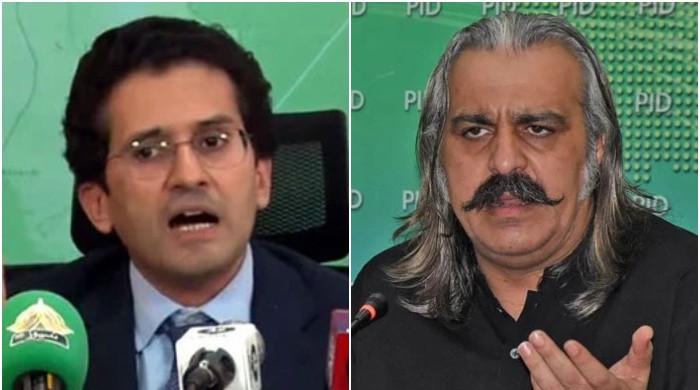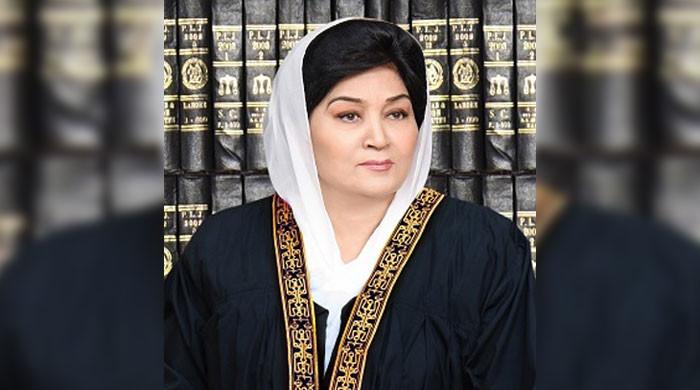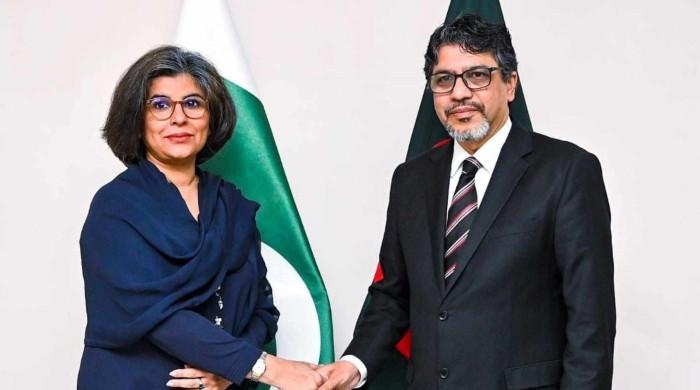Special court proceeds with Musharraf treason case today
ISLAMABAD: The special court is starting proceedings against former President Gen Pervez Musharraf in the treason case on Tuesday as the Islamabad High Court single bench comprising Justice Riaz...
December 24, 2013
Musharraf, through three different petitions, had challenged his trial by a special court instead of a military court, the composition of the special court and the appointment of Akram Sheikh as prosecutor.
Challenging his trial by a special court instead of a military court, Musharraf’s counsel Dr Khalid Ranjha argued that his client imposed emergency and the PCO when he was holding an office in the Pakistan Army and by virtue of Section 92 of the Pakistan Army Act 1952, the petitioner remains subject to the Army Act even after retirement.
Dr Ranjha contended that the special court constituted for his trial lacks jurisdiction and only a military court under Section 2 (b) (iii) could try him for the alleged offence.
He said that three generals were implicated in the National Logistics Cell (NLC) corruption scam but the military court took cognisance of the matter even after they were retired.
Dr Ranjha said that it wouldnot be out of place to mention that the imposition of emergency was not a decision made in isolation by the petitioner.
Proclamation of emergency on November 3, 2007 was outcome of discussions and decisions taken during the petitioner’s meetings with the then prime minister, governors of all four provinces and high command of military. Hence arraigning the petitioner alone is unjustifiable and reflects malafide and malicious intent on part of the prime minister.
In his second petition while challenging the constitution of a special court, legal counsel for Musharraf, Anwar Mansoor Khan argued before the court that not only the constitution of special court but appointment of the judges is also ultra vires of the constitution.
Under Section 04 of Criminal Law 1976 that was amended in 1977, constitution of a special court and appointment of the judges is prerequisite of the federal government.In this particular matter, federal government requested Supreme Court (SC) to nominate the judges.
It is written in the notification of the constitution of special court that federal government notified the special court in consultation with the apex court. Whereas the law does not provide for the consultation, Anwar Mansoor Khan also said.
This principle was settled in Wali Khan case when there were three high courts in the country and now there are five, he said.Why the guidance was sought from the apex court as the appeal had to be put before that forum, Advocate Khan questioned adding former Chief Justice of Pakistan Iftikhar Muhammad Chuadhry had a bias against Musharraf.
At this instance, Justice Riaz Ahmad Khan inquired that how come the petitioner say that the former CJP selected the judges for special court? Upon which Advocate Khan said that he was consulted. He said the apex court selected the judges and the federal government in a clerical manner notified them.
He said that the notification issued with regard to constitution of special court must have been in name of the president of Pakistan, being a symbol of unity of the federation.
A joint secretary, however, has signed the notification and there is no mention of president in it. The cabinet has also not approved the notification and it is from a single man that is prime minister of Pakistan, he said.
Advocate Khan argued before the IHC bench that in the matter of high treason act, previously there was no mention of ‘holding constitution in abeyance’. These words were inserted after the eighteenth amendment; so no case could be initiated from retrospective affect he added.
Advocate Khan said that the imposition of emergency was not done by Musharraf alone. He did it after thorough consultation. “But my client has been singled out in a vindictive manner,” he said. .
Judges selected for this special court are also biased and tilted, he said. Justice Faisal Arab of Sindh High Court, nominated for the special court, had dismissed Musharraf’s election petition saying he (Musharraf) subverted the constitution, he contended.
The second judge, Justice Yawar Ali of the Lahore High Court is a relative of a former apex court judge, Justice Khalilur Rehman Ramday, and has links with the former CJP Iftikhar Muhammad Chaudhry, he said.
The third judge, Justice Tahira Safdar of Baluchistan High Court, has always been a staunch supporter of the former CJP alongside her other family members, brothers and father.
Regarding the appointment of Akram Sheikh advocate as prosecutor in the special court, Advocate Khan said that a biased person could never become a prosecutor and that is settled by a Supreme Court judgment in the matter of Muhammad Ashraf Gujjar vs Malik Riaz.
Prosecution must not be persecution, Advocate Khan said. At this instance, Justice Riaz Ahmad Khan said that a prosecutor used to be a government servant. Advocate Khan then said that even if he is an employee and paid by the government, he needs to be independent as per Supreme Court judgment.
He said Advocate Sheikh met prime minister of Pakistan and requested him to be made prosecutor. He then issued statements in the electronic media and press that were derogatory with respect to his client, he said.
Akram Sheikh has long association with Prime Minister Nawaz Sharif and has grudges against his client Pervez Musharraf.The IHC bench however dismissed all the three petitions.











